Well, it’s been a year, so it’s about time to write another blog post, I guess. This one is about a common task for fall-time: writing recommendation letters for students on the job market.
 This post is musings about my process in writing letters of recommendation for students on the academic and other job markets. It might help those of you who will eventually ask for a letter from me (or from someone else) get a sense of what really matters as you slog your way through school.
This post is musings about my process in writing letters of recommendation for students on the academic and other job markets. It might help those of you who will eventually ask for a letter from me (or from someone else) get a sense of what really matters as you slog your way through school.
The first thing you should know is that by-and-large, I won’t write a letter of recommendation for someone I can’t actually recommend. If I’m writing you a letter, I believe in you and want you to get that job. I follow best practices as much as I can. Then I do this stuff:
What do I look at?
- Your transcript – But not for grades. I look at classes, think about themes, and consider what you’re trained in. But I basically ignore your grades.
- Your C.V. / resume. I have to match what you say about yourself, and I get all those vital details about what you’ve done from your C.V.
- Your own letter. Cover or statement of purpose letters tell me why you should get the job.
- Your work. Papers, projects, assignments all help me know what you do and how well.
What do I write?
Intro. I start with how long I’ve known you, a summary sentence about you that frames the rest of the letter, and why I recommend you for that specific position. If I can’t see a reason to recommend you for that specific job, I can’t explain in my letter.
Your interests. I explain what you’re interested in and how I believe that fits the job you want from my perspective. If your interests are too vague, I can’t make solid claims about them.
Your big project. Your thesis, some big project, your dissertation: I explain with some detail why that project is great, and, crucially, why it’s important in the field. Here the heart is theory. It’s a good recommendation if I can say your theoretical thinking is solid. Otherwise I’m just saying, “he did this one thing this one time.” If I can’t expand that into why it matters to later projects, research, and/or jobs, then the Big Thing isn’t really helpful for anyone but you.
Other projects. I add details about things you’ve done to fill in a clear picture of you as a [scholar/student/professional]. Good rec letters have specifics, and I use other activities and accomplishments (from your C.V.) to talk about them. If your C.V. is too thin on specifics including software, who you worked with, how big or small the tasks were, and what resulted from your work, then I don’t have enough to say.
Contributions to the field. I am on the hook, especially with grad school and academic job apps, to explain how you matter in the field/industry. I make claims from my position in the field about your potential in the field. Your letter and C.V. help me with that, but I also have to analyze your work to assess you professionally. Almost like a paper reviewer, I have to make claims based on my own knowledge and reputation about why you will make significant contributions. I use evidence, citing specific papers or projects, to make these claims. If I don’t see your best work, I won’t give you the credit you’re due. If your work isn’t good enough, I won’t write you a letter in the first place.
Your training. I talk about classes, certificates, our program, and what you’ve been trained to do. From your transcript I paint a picture of how what you can do fits what they need. I also talk about if and how you’re a hard worker, which shows mostly in how responsive you are to things you do with me (not grades, see above). If I’ve never worked with (or taught) you, I probably won’t write a letter.
Your skills. I explain what you can do and how I know that. I mention how many classes you’ve taught, what your evaluations were, what internships you’ve had, what jobs you’ve had, and how well you did in them. I don’t just say, “she can use Photoshop,” I say, “She is accomplished at Photoshop. She completed 15 complex projects using that software and taught other students how to use some of its more difficult tools.” That C.V. has to fill me in, here, or else I won’t be specific enough. (And lack of specifics is a sure sign of a polite but poor recommendation.)
Your teamwork. Yeah, I’m on the hook to say something about what it’s like to work and interact with you. If you’re an unpleasant but brilliant person I’ve decided to write a letter about, I find a way to gently suggest you work best alone. But if you work well with other students and help people out, that will be my go-to claim. If I don’t know how you interact with other people, I’m left with only my own impressions, and can’t say as much.
That’s my process. And my main recommendation to you? Make sure you have thought about each of these areas carefully, and find a way to communicate that to me. I want you to get the job! It looks good on me to have my people doing well. If you can find ways to help me help you, we’ll rock that job market together.

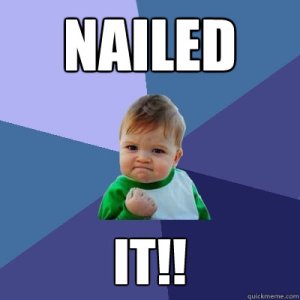

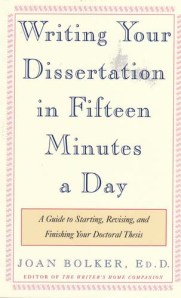 I urge my stuck graduate students to follow this advice, and if they’re really struggling, I make them go buy
I urge my stuck graduate students to follow this advice, and if they’re really struggling, I make them go buy 
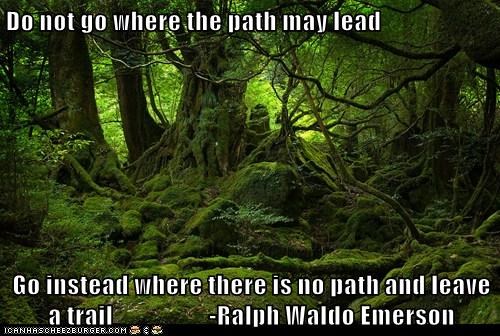
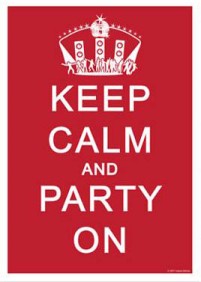
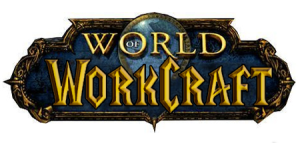

 I have been talking a lot about blogging recently, not just because I teach it in my classes, but also because I have been singing its praises in helping stuffy academics like me get more practice writing. Not everything is good fodder for a journal. But at the end of the day, academics are Writers, with all the concomitant foibles and joys. So more writing, specifically more blogging, is good for us.
I have been talking a lot about blogging recently, not just because I teach it in my classes, but also because I have been singing its praises in helping stuffy academics like me get more practice writing. Not everything is good fodder for a journal. But at the end of the day, academics are Writers, with all the concomitant foibles and joys. So more writing, specifically more blogging, is good for us.